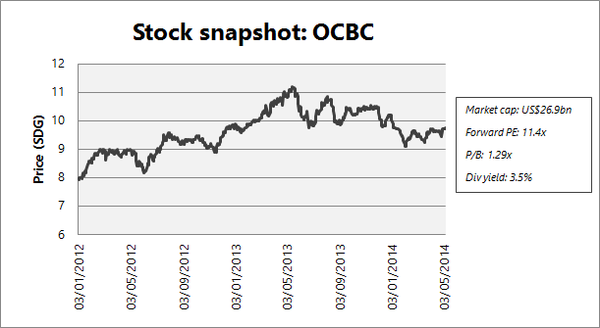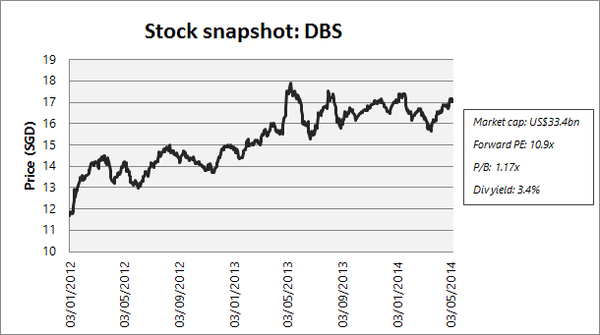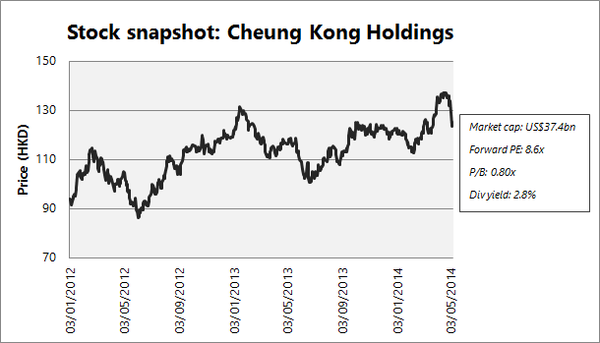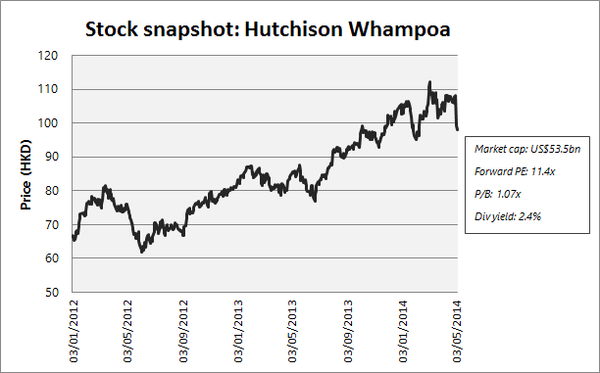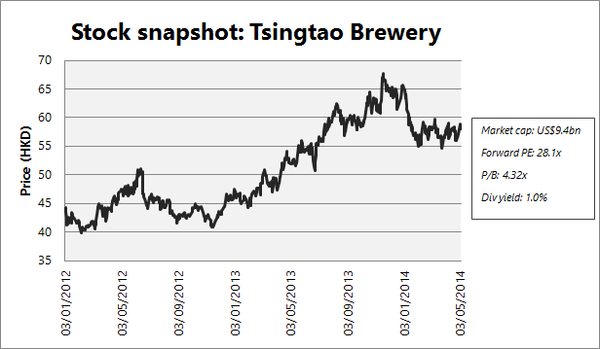Along with my Asia Confidential blog, I'll be launching a paid publication called Asia Money Masters (AMM) later this week. I thought I'd give you a sneak peak of the first issue though, via a full extract of the interview with Alistair Thompson that will be a part of the first issue.
Thompson is Deputy Head of First State Investment's Asia-Pacific (ex-Japan) business. He's best known as having co-managed First State's Asia Pacific Leaders Fund with Angus Tulloch. This fund has crushed the indices over a long period of time.
Thompson recently stepped down from co-managing this fund, but remains actively involved in managing several other funds, including the similarly-successful Asian Growth Fund.
In a wide-ranging interview with AMM, Thompson outlines how finding growth stocks at reasonable prices is becoming more difficult but he's still finding value in Singaporean banks, Oversea-Chinese Banking Corp (SIN:OCBC) and DBS Group Holdings Ltd (SIN:DBSM), Li Ka-shing companies such as Cheung Kong and Hutch, as well as Chinese brewer, Tsingtao (HK:0168).
AMM: Your funds management career began in 1989 and you started covering Asia in 1992. It must have been a wild ride in those early days with the large inflows into Asia from 1992-97 and then the subsequent financial crisis?
Alistair Thompson: It was a fascinating experience where you can see markets rise dramatically. I believe in the fourth quarter of 1993, Thailand and the Philippines' stock markets nearly doubled.
Then in 1997, there were brutal declines. And you got the Hong Kong government stepping in to set up the Exchange Fund, for instance.
It was interesting to see the change in management psychology as well. Thai companies in those days would rarely come up to Edinburgh. But all of a sudden in 1998, they were desperate to come and try to get fund managers help to recapitalise their businesses. It went from irrational exuberance to extreme humility.
You moved from Edinburgh to Singapore in 2003. How did that come about and has it been advantageous to you to be based in the region?
AT: I joined First State in 2003. Colonial had acquired Stewart Ivory in 2000. Stewart Ivory was based in Edinburgh while Colonial had investment teams in Hong Kong and Singapore. I moved down to Singapore in 2003 to integrate those teams properly with Edinburgh, get them on the same incentivisation structure, the same investment process and philosophy and everything else.
One of the main advantages of being based in Asia is corporate access. There are many companies which pass through Singapore. The disadvantage though would be that there is quite a lot of noise so the key is to filter the noise.
Fast forwarding to 2008 and beyond. How do you see Asia's recovery from the financial crisis and the challenges for the region today?
AT: Most of the Asian corporates, ever since the Asian crisis, have been extremely risk-averse so corporate balance sheets are in a good health. I believe the recent financial crisis was one that Asian companies were pretty well prepared for.
As for the main challenges at the moment, China is in a much more difficult position than it was in 2008. Economic growth there is becoming a lot harder to come by. And then, of course, you've got politics: North Korea, India, Malaysia, China, Thailand - it's a risk which is always there in Asia.
From a macro viewpoint, your firm seems to be extremely cautious about economies and markets, particularly in the West at this stage...
AT: I think you have got to understand that the office in Edinburgh is flanked by the Royal Bank of Scotland on one side and the Bank of Scotland on the other.
Well, that explains it...
AT: It's sitting right in the eye of the storm. More seriously, there's still a huge amount of reliance on central banks and a lot of the problems haven't been solved in the developed world. People have been living way beyond their means. The medicine that the IMF prescribed to Asia in 1997-1998 was to stop spending, start saving, sell assets and repay debts. That hasn't really happened in the West post-2008.
Last year, the Federal Reserve Bank's balance sheet grew by one trillion dollars. There's still a huge amount of risk out there.
Conversely, rarely do we have a meeting with an Asian corporate or indeed a central banker where the Asian crisis isn't mentioned. It's still very much at the forefront of their minds.
Your style seems more bottom-up than top-down. Is it too simplistic to say that your style is to buy growth at a reasonable price, or a GARP approach?
AT: Given our Scottish heritage we use the acronym, GASP: "Growth At A Scottish Price".
The first decision we make is: "Is this a good company and should we do some more work on it?" Rather than saying: "China is going to grow at 'X' percent, so let's put 20% of the portfolio in China." It's just the order of the decision.
At the moment, it's very difficult to find value. While the macro environment is terribly important, it tends to come secondary for us. Look at China - it's been the fastest growing economy in the world and one of the worst performing stock markets.
On the other hand, the Indian privately managed banks, for example, have done phenomenally well, even though India has been a challenged market - politically and economically - over the years.
The Asian Growth Fund which you manage runs large country and sector overweights and underweights. Consumer staples are a significant overweight, while with tech, you're significantly underweight. Is that strategic or a consequence of the bottom-up stock picking?
AT: It is a consequence really, although we find that with the technology sector, earnings tend to be a lot more cyclical than other sectors. Essentially because technology becomes commoditised over time and life cycles get shorter and shorter. That said, there are some extremely good tech companies in Asia, like TSMC (Taiwan Semiconductor Manufacturing (NYSE:TSM) and Samsung Electronics Co (KS:005930), which have done very well over the years.
But our process in a nutshell is buying good quality management with strong franchises and healthy balance sheets. We favour consumer franchises because they tend to have significant pricing power and generate a lot of cash.
What do you look for from a company's management?
AT: Our company is called First State Stewart and the word 'stewart' relates to our view. Eight hundred years ago, it was the Scottish word for 'steward' and we very much view our job as stewards of our clients' capital. Equally, we are looking for management which have a similar approach - that they are stewards of our money.
A lot of things go into it: management, integrity, their attitude to risk, the way that they're incentivised which often influences behaviour. All of these things are very important when it comes to management because we want them to take long-term decisions, not be forced by short-term market moves which, unfortunately, are symptomatic of our industry.
Ultimately it comes down to trust: do you want to back these people? And that involves a lot of meetings with them: senior management, middle management, their team factories etc. It's terribly important. You cannot compromise when it comes to the quality of management.
Now, there is no such thing as a perfect company. But you can mitigate a lot of risk by backing good management. We look at their track record, their performance and where they have been at different companies and the makeup of boards of directors.
All of these things are absolutely critical because if you look at the First State Stewart's funds' performance since 1988 - when we launched our first Asia Pacific Fund - we tend to preserve capital when risk is high.
Every fund manager will tell you that they're investing in quality companies. The real test is how those companies perform in falling markets and we tend to preserve capital much better in falling markets.
What would be more important: the business franchise or management?
AT: It's difficult. You can have poor management and do some damage to a strong franchise. Brambles (ASX:BXB) in Australia has been challenged in the past. It's not now - you have got some very strong management. But in the past, it has been a bit challenged. Here you have got a very strong business which in some markets has strong oligopolistic traits. But if the management get it wrong and they incentivise management on revenue and not profits or returns, then it can quickly come unstuck.
In terms of valuation metrics - what are the ones you look at?
AT: We look at a variety. We look at price-to-cashflow. We look at price-to-book where we can - it's harder to manipulate the book value. We look at market cap per hectolitre for brewing companies. We look at market cap to deposit for banks, which is a good test of the valuation of the franchise there. Replacement costs - that was a useful tool during the Asian crisis. So we look at a whole range of valuation methods.
In the top holdings of your Asian Growth Fund, Singapore banks feature strongly: OCBC and DBS. What's the investment case here?
AT: Number one: the Singapore banks are extremely well regulated. Singapore banks are one of the best regulated in the region, if not globally. Secondly, they're very well capitalised. They have decent dividend yields as well - roughly 4% in Singapore dollars. And we believe the Singapore dollar will continue to appreciate in the long-term.
These banks are also very well managed. DBS has been a lot more challenged than OCBC over the past 10 or 20 years. Piyush Gupta, the CEO of DBS, is doing a fabulous job and that has been reflected in the share price.
But both companies still look reasonably cheap: DBS trades at a small premium to book value. OCBC is a bit higher because the returns of equity are higher.
Net interest margins have been under pressure at both and one of the main reasons is that the interest rates are extremely low and in our view unsustainably low globally. These margins will rise when interest rates rise and so should returns on equity.
They are the two very high quality companies that allow you to sleep well at night. Until interest rates start to go up though, we don't see too much upside for these stocks in the short-term.
What are your thoughts on OCBC's recent acquisition of Wing Hang Bank in Hong Kong?
AT: There are relatively limited acquisition opportunities for banks in Asia. Wing Hang Bank (HK:0302) is an opportunity for OCBC to expand in growth to China. The valuation that OCBC is paying is a full one and it'd be the first to admit that. But Wing Hang is a well-managed bank with a good franchise and it gives some growth opportunities beyond OCBC's existing markets.
Your fund has heavy exposure to Li Ka-Shing's companies, including Hutchison Whampoa and Cheung Kong. What's the rationale behind those investments?
AT: Li Ka-Shing is the wealthiest man in Asia and it probably pays to keep a close eye on what he's doing. He continues to buy shares in Hutchison Whampoa (HK:0013) and Cheung Kong (HK:0001), as do other senior managers. These companies have quality management. They have some great assets in property, ports, power, telcos, water and supermarkets. The balance sheets are very strong. There have also been special dividends from Cheung Kong. Thus, Li Ka-Shing is prepared to treat minority shareholders well.
Li Ka-Shing is also a very good trader of assets. He's been a heavy investor in the UK at the bottom and arguably has called China extremely well [selling assets there over the past 18 months].
Li Ka-shing is 85 years of age. Is there a succession issue at these companies?
AT: Yes there is. Victor Li, his eldest son, is the heir apparent. Victor has a reputation for being a safe pair of hands. He probably delegates a bit more than his father. Li Ka-shing remains very involved in the businesses though.
These companies aren't run for the next one to three years. They're run on a much longer investment horizon than your average equity investor has and therefore the decision making tends to be a bit more measured.
We're not too worried about the succession issue. It's an issue across a lot of companies in Asia. But on the whole, Li Ka-shing is managing this issue pretty well.
Is there a lot of upside for Hutch and Cheung Kong at current levels?
AT: Cheung Kong is trading at a 20% discount to book value and that is attractive. Hutch isn't as cheap. But then you have got the telco assets which are looking a lot better now, having had problems for the past 10 to 15 years.
You're referring to the European telecommunication assets?
AT: That's right. Perhaps earnings forecasts are being under-estimated at Hutch.
We're pretty happy with the holdings. We use the analogy that a portfolio is like a garden: it's the herbaceous border portfolio theory. I don't know if you have heard it, but it's essentially that in your portfolio, you don't want all of the flowering and blossoming at the same time. You want some colour during winter and you tend to have your hardy perennials and then you have your smaller companies which hopefully will take root, grow and flourish. Or, indeed, if they don't, then you weed them out.
Cheung Kong and Hutchison - just like Hong Kong China Gas Holdings (HK:0384) and CSL Ltd (ASX:CSL) in Australia - these are hardy perennials. These are companies which have been in our portfolio for many years. We envisage they'll be in the portfolio for many more years because they're very good stewards of capital.
With these "hardy perennials" then, if they reach fair value or a bit above, you're unlikely to be sellers?
AT: That's right. This is the challenge at the moment because our investment style has been very popular in recent years. A lot of consumer companies have performed well and have become richly valued.
I was going to mention earlier that the consumer companies have had a great run of late, particularly in Thailand, India and even Indonesia. The consumer sector does look expensive especially versus some other sectors such as financials...
AT: Yes, though we're still finding some opportunities. Recently, we've bought Tsingtao Brewery (SS:600600) in China, which has a PER in the mid-20s [ed: now 28x] having come down from the mid-30s. Maybe that will be dull for the next couple of years, but we're quite fortunate that our investment horizon is three to five years.
These types of companies may go to sleep for a year or two but beyond that, we think that there are opportunities. We wouldn't pay 35 times earnings for a company. But 25 times, growing 15 to 20 percent a year looks OK in this environment.
We haven't had a shock for a while. In 2008, there was a big collapse and you could pick up some real bargains. I suppose we'd rather like to see something like that happen so we can pick up some cheaper stocks.
